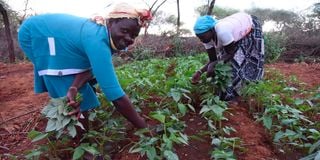Tiaty can feed entire country, give it a chance

Members of the Lopoin Women Group in Tiaty, Baringo County, Hanley Achapan (left) and Linah Totwai, harvest vegetables in Kitailem village, Tangulbei on April 26, 2022.
My latest trip to Tiaty in Baringo County, was an eye opener. I discovered hope in the desolate land of sunburnt vegetation and cattle rustling. The earth road off Loruk via Kadingding to Silali hills is graded though you still need all wheel monsters to drive through.
Driving along, you notice something atypical: Tens of small lots of lush maize crop. Lots of them. Anyone who has been here before will attest that this semi-arid land can be unforgiving to plants. Yet it appears that there is change.
In fact, in one of the portions, there was also an impressive crop of sorghum, another had beans and yet another spinach. So, what changed? My curiosity was finally answered: Water from the recent rains. When the downpour came, some families decided to experiment with farming. Now, this experiment has fascinated locals. They want to do more.
And mark you, no fertiliser was used. Janet, a geologist in our entourage, explained that the region is splashed with volcanic ash that is rich with minerals for plants. Indeed, Tiaty, judging from the many craters and calderas, this is a volcanic belt.
Folks here say they had never planted and harvested anything before. Now, wowed with the impressive results, they would love to do more. They want to settle too and take their children to school, they say. It’s a Mesopotamia moment of sorts here.
This might be small, but it gives a fresh peek into new possibilities. Indeed, this vast land could be a game-changer in Kenya’s food security architecture. What’s required is robust planning, investment and scaling up of what has been tried.
Organised commerce
Besides, farming cultivates settlement. Settlements will, naturally, produce organised commerce. It’s also efficient to provide social services and civic administration to settlements. Eventually we will be talking of improved human security, not just food security. But to achieve all the lofty ideals of settlement, agriculture, exports, food security, the State must act. This land needs water.
Lake Baringo is a good source of fresh water that can be sustainably abstracted for irrigation. The massive geothermal energy here can also be deployed to affordably power irrigation programmes.
The KfW Development Bank and the Geothermal Development Company (GDC) have done something incredible here. They have laid a water reticulation system spanning 160 kilometres for domestic and livestock use. That model can now be extrapolated at scale to support irrigation.
It’s time policy makers and planners sitting in Nairobi recalibrate their approach towards places like Tiaty. The skewed thought of equating productivity to rainy highlands is lazy and archaic.
Besides, the future of agriculture is not in rain. It’s in irrigation. Rain-fed agriculture is largely inefficient and has in the past made our society, especially planners, lazy. It has robbed us of imagination and innovative appetite for prosperity. Give Tiaty a chance. The wealth of the nation is here too.
Mr Wamanji is a communication advisor. [email protected],@manjis





